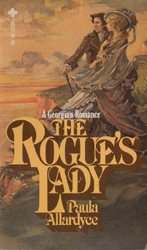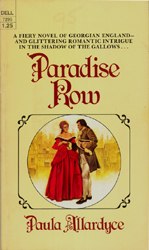Paula Allardyce/Actress
Novels
 In
the sixties, Paula Allardyce wrote several Regency and Georgian
novels that empoyed Shakespeare. In her version of the "actress
novel," The Rogue's Lady (1961) and Paradise Row (1964),
the heroine is typically an actress who has retired from the stage
to marry. In Rogue's Lady, that marriage is as disastrous as her
acting career during which Garrick hires and mocks here as Celia in As
You Like It. Rozel Masurier, rescued from the inevitable pelting
fruit, marries her rescuer, Lord Dacre, only to discover that he is
the worst of wife abusers. Her rescue and flight to Jersey with an
unwilling highwayman comprise the bulk of the book, and Shakespeare
appears principally in her stray quotations or her rescuer Ahab
Smith's observations about her: "He looked up at her as she
stood there on the third stair, a miniature Lady Macbeth or more like
Katherine, ripe for her taming" (123). Shakespearean quotations
and allusions are dismissed along with her acting or rather
histrionic abilities by the end of the novel.
In
the sixties, Paula Allardyce wrote several Regency and Georgian
novels that empoyed Shakespeare. In her version of the "actress
novel," The Rogue's Lady (1961) and Paradise Row (1964),
the heroine is typically an actress who has retired from the stage
to marry. In Rogue's Lady, that marriage is as disastrous as her
acting career during which Garrick hires and mocks here as Celia in As
You Like It. Rozel Masurier, rescued from the inevitable pelting
fruit, marries her rescuer, Lord Dacre, only to discover that he is
the worst of wife abusers. Her rescue and flight to Jersey with an
unwilling highwayman comprise the bulk of the book, and Shakespeare
appears principally in her stray quotations or her rescuer Ahab
Smith's observations about her: "He looked up at her as she
stood there on the third stair, a miniature Lady Macbeth or more like
Katherine, ripe for her taming" (123). Shakespearean quotations
and allusions are dismissed along with her acting or rather
histrionic abilities by the end of the novel.

Paradise Row presents both a
happier marriage and more congenial Shakespearean allusions.
Cassandra Shelbrooke remains a self-dramatizing woman even after her
marriage to Francis Shelbrooke. Their marital problems dissipate in
the wake of several adventures in the London criminal world, and
their reunion occurs through the invocation of Shakespearean heroines:
He exclaimed in a confusion
of rage and laughter and desire, "What the devil is all this
playacting? Do I have to stand here in the cold while you play out
your Beatrice or Juliet or whatever the hell it is?"
"Rosalind," said
Cassandra. Then she raised her chin as if speaking to the gallery.
Her voice came, high and clear. "'A lean cheek, which you have
not; a blue eye and sunken, which you have not; an
unquestionable--an--an'" Then she gave a great cry of triumph.
"'An unquestionable spirit, which you have not--'"
He did not answer. He only
smiled at her, a great wide smile that stopped her speech as if she
had been gagged. Then silently but in a great rush he came to her,
and the door slammed behind him."
Her playacting and her
Shakespeare naturally give away before the renewal of her marriage,
even though that playacting is part of what enabled them to survive
the threats to their lives throughout the novel.

 In
the sixties, Paula Allardyce wrote several Regency and Georgian
novels that empoyed Shakespeare. In her version of the "actress
novel," The Rogue's Lady (1961) and Paradise Row (1964),
the heroine is typically an actress who has retired from the stage
to marry. In Rogue's Lady, that marriage is as disastrous as her
acting career during which Garrick hires and mocks here as Celia in As
You Like It. Rozel Masurier, rescued from the inevitable pelting
fruit, marries her rescuer, Lord Dacre, only to discover that he is
the worst of wife abusers. Her rescue and flight to Jersey with an
unwilling highwayman comprise the bulk of the book, and Shakespeare
appears principally in her stray quotations or her rescuer Ahab
Smith's observations about her: "He looked up at her as she
stood there on the third stair, a miniature Lady Macbeth or more like
Katherine, ripe for her taming" (123). Shakespearean quotations
and allusions are dismissed along with her acting or rather
histrionic abilities by the end of the novel.
In
the sixties, Paula Allardyce wrote several Regency and Georgian
novels that empoyed Shakespeare. In her version of the "actress
novel," The Rogue's Lady (1961) and Paradise Row (1964),
the heroine is typically an actress who has retired from the stage
to marry. In Rogue's Lady, that marriage is as disastrous as her
acting career during which Garrick hires and mocks here as Celia in As
You Like It. Rozel Masurier, rescued from the inevitable pelting
fruit, marries her rescuer, Lord Dacre, only to discover that he is
the worst of wife abusers. Her rescue and flight to Jersey with an
unwilling highwayman comprise the bulk of the book, and Shakespeare
appears principally in her stray quotations or her rescuer Ahab
Smith's observations about her: "He looked up at her as she
stood there on the third stair, a miniature Lady Macbeth or more like
Katherine, ripe for her taming" (123). Shakespearean quotations
and allusions are dismissed along with her acting or rather
histrionic abilities by the end of the novel.
